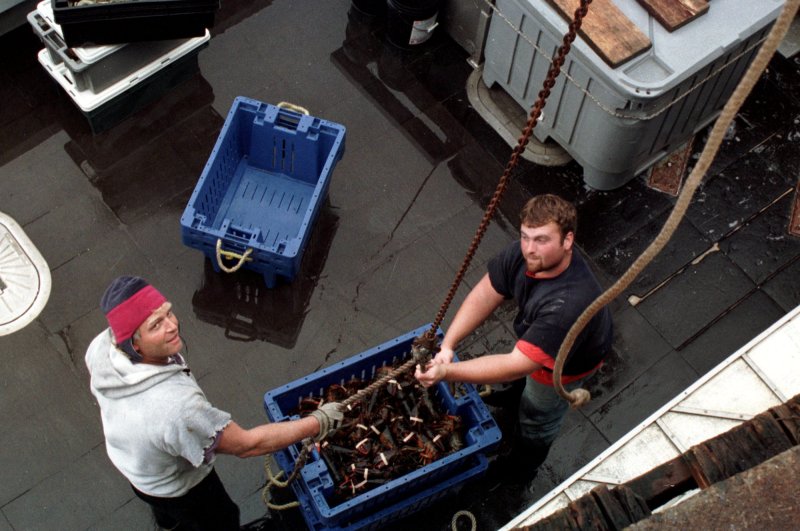Federal appeals court reinstates ban on lobstering in Gulf of Maine

Maine lobstermen Mark Rand, left, and Dick Mancini prepare to heave a crate of lobsters lifted off from their boat to be unloaded into lobster tanks at New Meadows Lobster Pound in Portland, Maine. File Photo by Lee K. Marriner/UPI | License Photo
Nov. 17 (UPI) -- In an effort to protect endangered whales, a federal appeals court reinstated a ban on traditional lobster fishing on a nearly 1,000-square-mile stretch of the Gulf of Maine on Wednesday.
The move comes after federal fisheries officials released a new set of restrictions on Main's iconic lobster fishery earlier this year, including state-specific gear marking and weak points in rope to allow whales to break free.
The law won't go into effect until May, after an October-to-January season closure requiring fishermen to remove their gear on Oct. 18.
The Maine Lobstering Union fought the decision, and U.S. District Judge Lance E. Walker temporarily halted the closure until details and science behind the decision could be thoroughly checked.
In turn, the national marine Fisheries Service and conservationists appealed the decision in the U.S. District Court in Bangor, stating that the whale population declined by 30 in just one year. The motion was denied, and the group sought an appeal from the U.S. Court of Appeal for the First Circuit in Boston.
The court ruled that the district court didn't have the jurisdiction to reject the judgment of the Fisheries Service, which has been charged by Congress to protect endangered animals.
"The First Circuit's decision affirms that the best available science and the law demand action now," Conservation Law Foundation Attorney Erica Fuller said in a statement.
"Right whales can't wait for the perfect empirical data Judge Walker sought."
The Maine Lobstering Union plans to continue to fight the ban.
There are fewer than 336 North Atlantic right whales remaining, many of which are vulnerable to getting entangled in fishing gear and are killed in ship strikes.
The Maine Lobstering Union plans to continue to fight the ban.
There are fewer than 336 North Atlantic right whales remaining, many of which are vulnerable to getting entangled in fishing gear and are killed in ship strikes.









 © Provided by The Canadian Press
© Provided by The Canadian Press

